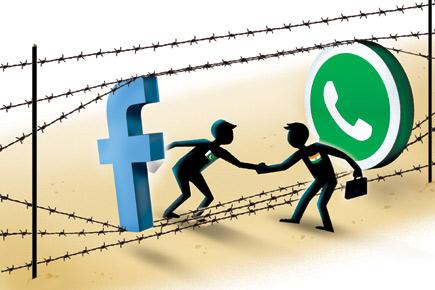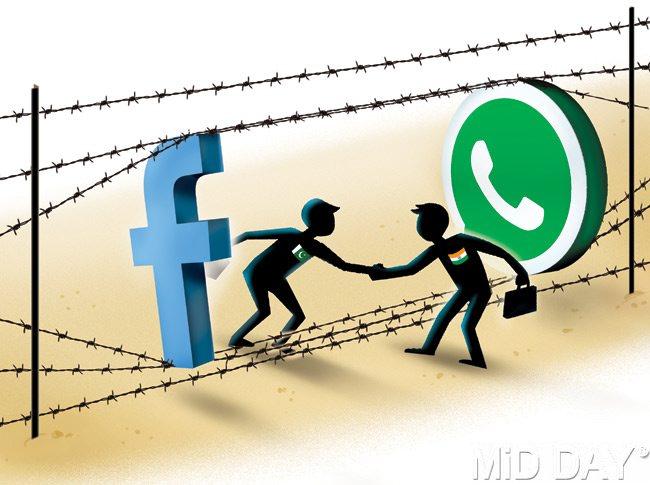Nine pairs of Indians and Pakistanis are out to bring their countries together through honest, frank discussions. Anu Prabhakar writes about the Building Peace Project that aims to pull off the task

Love accross
Sheharyar Rizwan leads a nocturnal existence like most other sub-editors of newspapers. The 29-year-old sub-editor and occasional feature writer at Pakistani newspaper, Dawn, works late into the night, till the edition is sent to press, and spends his days catching up on sleep. To him, every minute counts.

Illustration / Amit Bandre
So when he does have some time to spare, Rizwan doesn’t while it away. Instead, he pings his friends in faraway India, as part of a project that aims to bring the two countries closer through social, political and, sometimes, religious discourse.
About the project
The Building Peace Project, by Chennai-based NGO The Red Elephant Foundation, was launched in March this year. The NGO’s founder and project brainchild, Kirthi Jayakumar, explains that nine young Indians and Pakistanis are paired with each other to discuss issues that trouble their respective nations, via Skype, Facebook, Gchat, Whatsapp or any other online platform. Here, nothing is off limits — Kashmir, Siachen, Taliban, terrorism, violence against women and much more are on the agenda. Topics for discussion are pre-decided by a curriculum which includes everything from religion to culture, soft power, literature and everyday politics, says Jayakumar. “At the beginning of every month, the topic is announced and participants are given video and reading material on the same,” she adds.
“Not everything that mainstream media writes or talks about India and Pakistan is entirely accurate always,” says the 26-year-old, while explaining the need to start the project. “It’s not that Pakistan is absolutely intolerant of India and vice versa. We wanted to bring youngsters together and help them make friends by interacting with each other,” she adds.
The aim is to hold a summit by the end of this year-long project where the participants can decide on a manifesto to present to their respective governments. But funding might pose an issue, points out Jayakumar. “So right now, we are looking at a summit in the web format,” she adds.
Lectures on the month’s topics are uploaded on the project’s private YouTube channel. At other times, lecturers have an interactive session with participants via Google Hangout. Raakhee Suryaprakash, one of the project’s four organisers, recently conducted a lecture on Hinduism. “The participants openly talk about honour killings and cases of violence against women. Everybody’s accepted their countries’ strengths and weaknesses,” points out the 31-year-old.
‘I am now called Apa’
“Let’s not forget that India and Pakistan were once one,” says Rizwan, while explaining his reasons for joining the project. Rizwan and his project partner, Mumbai-based Chintan Modi, have so far discussed movies (Rizwan is a huge fan of Bollywood), music and gender-based violence, likes, dislikes, friends, family and hobbies among many other topics. “Chintan has talked extensively about his love for shrines,” adds Rizwan. “When he visited Lahore last year, we got to talk about Jainism, of which he is a follower. I knew it was a religion but nothing more and Chintan told me quite a lot about it. So that added to my knowledge,” he remembers.
Nidhi Shendurnikar, senior research fellow at the Maharaja Sayajiro University of Baroda, is another participant. Her Pakistani partner is Sehr Nisar, a first-year college student of economics in Lahore. “One of the stereotypes I had, which was subsequently shattered, was about the hijab. I always used to wonder why women have to wear a hijab. But Nisar explained that a woman does not always wear a hijab out of compulsion. She explained to me that it’s a personal choice for many women in Pakistan,” elaborates Shendurnikar, who is lovingly called ‘Apa’ (elder sister) by Nisar. Meanwhile, Rizwan thinks of one more way the project has changed his life. “I finally learnt the meaning of ‘namaste’,” he says.
ADVERTISEMENT
 Subscribe today by clicking the link and stay updated with the latest news!" Click here!
Subscribe today by clicking the link and stay updated with the latest news!" Click here!







